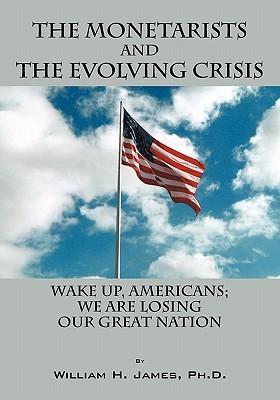Title: The Monetarists and the Evolving Crisis: Wake Up, Americans; We Are Losing Our Great Nation
Author: William H. James, PhD
Publisher: Outskirts Press
ISBN: 978-1432770990
Pages: 368, Paperback & Kindle
Genre: Political Science
Reviewed by: Brandon Nolta, Pacific Book Review
Book Review
When undertaking a book to explain a complex subject, an author faces a daunting task. Creating a work that’s comprehensible to a lay audience, while communicating key concepts accurately and in depth, is often a tightrope act between oversimplification and inscrutability. It’s a challenge that many authors fail to meet, such that the effort to overcome such obstacles is often admirable in its own right. Unfortunately, despite Dr. William H. James’ erudition and passion for the subject of monetary policy and the various effects it has on the United States strategic power, his book The Monetarists and the Evolving Crisis is an example of an author’s reach exceeding his grasp.The problem here is not one of ideas, as many of Dr. James’ concepts are sound, but presentation. To be fair, this is a flaw Dr. James himself is aware of, and addresses in the preface to his book. However, mentioning this flaw in presentation does not excuse the material from suffering for it. Whenever an author begins several sentences with a variation of “Stating some of the preceding thoughts in still another way,” it’s clear that both the passive voice and a reader’s vocabulary will get a workout, and not in an intellectually stimulating way. Betraying a familiarity with the worst type of academic writing, the sentences in this book are repetitive, filled with nested clauses to an astonishing degree and labyrinthine in their labors. If this book were intended to be a high-level scholastic text, these flaws would be less of an issue, and possibly even expected. However, for a work the author clearly intends for a lay audience, such strained construction is anathema.
Perhaps worse, however, is the maddeningly vague nature of the writing, which promises much in the way of explanation but fails to deliver in a timely fashion or at all in some cases. Throughout the book, the author repeatedly says that various aspects of his theories are explained in the book, but essential concepts are glossed over or included without prior explanation. For example, when discussing his formula for explaining the current monetary system, he cites bankruptcies as a primary method for keeping one of the variables small and thus keeping money in circulation, but doesn’t explain why bankruptcies are the main reason cited, or if that is the only value for the variable. Given his stated concern for how the monetary system functions as a component of national strategic potency, establishing these concepts is vital. Coupled with this vague handling of certain concepts – which are very likely second nature to Dr. James, who is highly educated and has clearly devoted extensive thought to these concepts – is a prodigious amount of repetition of terms and sentence construction. Within the first several pages, the degree of repetition with certain terms, such as “nation-weakening” and “monetarist,” causes the words to lose their meaning, which is further impediment to understanding Dr. James’ work.
Is the information presented in Dr. James’ book conducive to having a greater understanding of U.S. domestic and foreign policies, and thus being an educated, empowered citizen? Absolutely. However, those who need an introduction to such concepts would be best served by looking elsewhere.


